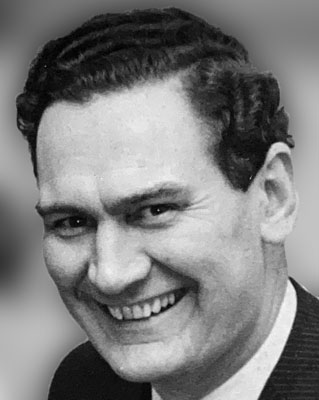Tribute by Mary Payne (pp RL webmasters Chris and Mary)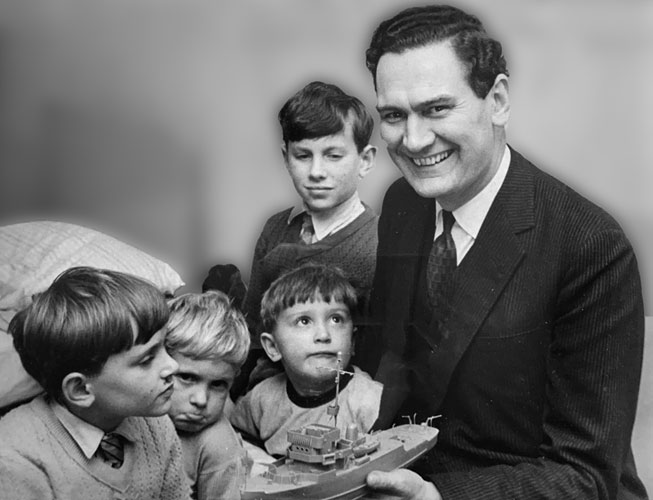
I am disappointed that I never had the opportunity to meet Philip Birch, as I would have liked to have thanked him very much for bringing Radio London to fruition in 1964 as Radlon Sales' Managing Director. The station had a massive impact on British radio and on the lives of so many people who had come to feel that they were part of a huge Big L family. As the current custodians of the station name and heritage, Radio London continues to be a huge part of our lives today.
In his memoirs, Big L's original Programme Director Ben Toney, described Philip as, "An obsessive Anglomaniac who at times was more English than the British."
(Right) Philip's daughter Philippa very kindly supplied: "A photo that hangs on the wall at my parents' house with dad's four sons (my half-brothers) and a model of the Galaxy."
According to Ben, Philip's relationship with the station's main Texan backer, Don Pierson, was a thorny one.
"Not only should they have been in separate rooms, but also separate continents. Don had failed to keep Philip abreast of what was going on, and Philip and his two salesmen, Alan Keen and Dennis Maitland, were wandering around London trying to sell something they knew nothing about. At first they didn't even know the station name and were selling it as 'Radio X'. Philip had thought of calling the station 'Radio Galaxy'. However, unknown to Philip, Don had already named it Radio London, and had contracted to have jingles recorded in that name. There was a definite breakdown in communications between Don and Philip, and there was not a great amount of interest on the part of either party to come to reconciliation."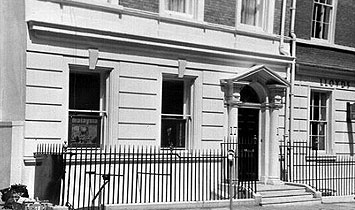
When Ben Toney arrived in the UK, he explained to Philip and his sales team that the new station format would be Top Forty radio.
(left) Radlon's Mayfair offices at 17, Curzon Street
"I emphasised that this type of radio plays all the top songs of the day with a few oldies thrown in. This format had been used in every major market in America and that in practically every market, the Top Forty station was number one. I explained that I did not intend to have any canned or block programming whatsoever, and that I expected to have deejays on the ship at all times to deliver the programmes."
Having established that the station name was Radio London, Philip would have wanted the all-important advertisers to know exactly what his 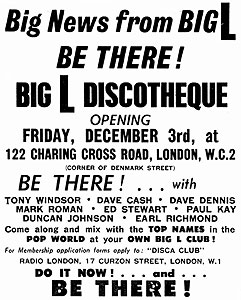 company was about. He must have been immensely frustrated to find himself unable to register the company with the Radio London name. When he applied to Companies House for registration, the name Radio London (Sales) Ltd was rejected as being too similar to Commercial Radio (London) Ltd, which was an organisation associated with Radio Luxembourg. Philip reapplied and registered Radlon (Sales) Ltd. company was about. He must have been immensely frustrated to find himself unable to register the company with the Radio London name. When he applied to Companies House for registration, the name Radio London (Sales) Ltd was rejected as being too similar to Commercial Radio (London) Ltd, which was an organisation associated with Radio Luxembourg. Philip reapplied and registered Radlon (Sales) Ltd.
(Right) Press advertisement for the launch of the Big L Discothéque
As the new station gained both popularity with audiences and credibility with major advertisers who appreciated the potential of commercial radio, other business ventures were set up around the Radio London brand. The Radio London Club was registered independently of Radlon (Sales) Ltd as the Big L Club Ltd, with Philip and M I Brook Greville as its directors. Its purpose was to keep listeners updated with station news and photos of the DJs. It also promoted the sale of teeshirts and other merchandise, offering a discount for members for merchandise and admission fees to gigs. Both the Radio London Club and the Big L Discothéque were run from Radlon's existing offices at 17 Curzon Street. The intention had been to follow up the London launch of the discothéque with the opening of a chain of clubs across the country, but this never materialised. (In 1965, the word 'discothéque' had not yet been abbreviated to 'disco'.)
In March 1965, Philip set up Pall Mall Music Ltd, a music publishing company, with Harold Shampan, in which Radlon Sales had a 50% shareholding. Radlon soon went on to become involved with promoting numerous onshore events, including concerts, club nights and motor racing.
Philip also established The Philip Birch Agency, which represented all the Big L DJs and several bands including Episode Six, The Style and Jon. After the station closedown in August '67, the agency continued to be run by former Radlon employees Brenda Cogdell and Gordon Sheppard, but with Radio London gone, it survived only to the end of the year
Although the Marine Offences Act was scheduled to become law in August 1967, Radlon management had high hopes of continuing broadcasting and explored a number of ideas for survival. Sadly, none of these came to fruition and Philp had to break the news to his staff that the end was in sight for Big L. He revealed that Radlon wanted to be able to tender for a licence for a land-based station, but he knew that one application had been turned down already.
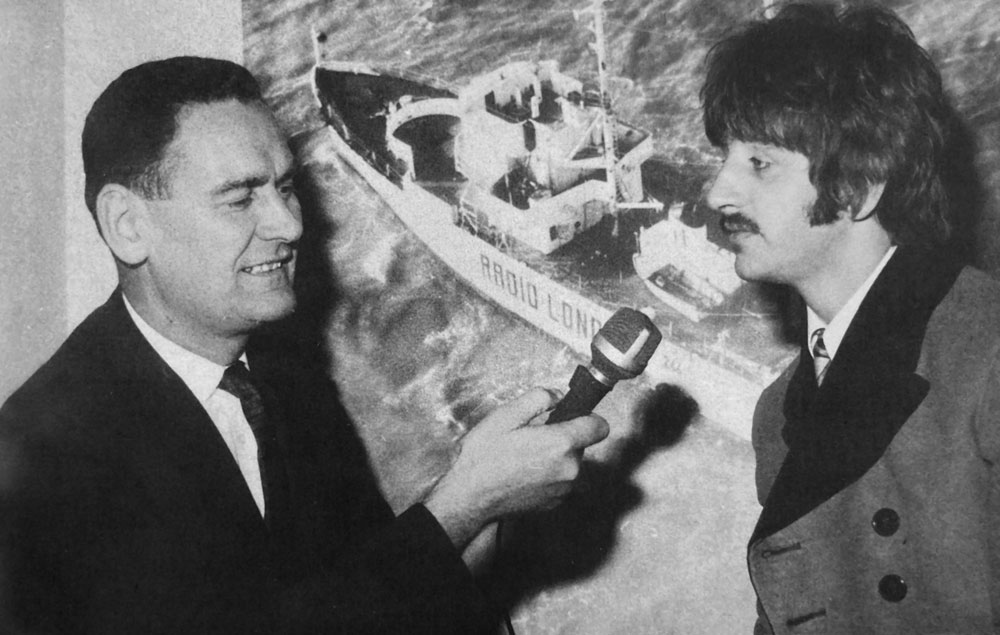
A publicity shot issued by the Keystone Press Agency Ltd, of Philip in Curzon Street office with Ringo Starr.
Ringo recorded a farewell message to be included in 'Their Final Hour' on August 14th.
The backdrop is the famous aerial photo of the Galaxy that enhanced the office wall.
On July 28th, when he made public the decision to close Big L on August 14th, Philip said, "We understand that the new government programme, which is to be called Radio 1, is largely modelled on Radio London and will employ many Radio London deejays. We receive hundreds of thousands of letters from listeners, but possibly this government imitation is the greatest tribute of all."
To that end, a secret visit to the Galaxy to examine the Big L studio operation and programming was made by BBC Producer (and subsequent Controller of Radio One) Johnny Beerling.
Click here to see Page 2 of the tribute |
